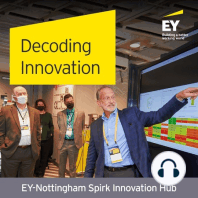54 min listen

Why seagrass is an effective replacement for fossil-based plastic
Why seagrass is an effective replacement for fossil-based plastic
ratings:
Length:
28 minutes
Released:
Nov 6, 2023
Format:
Podcast episode
Description
In this episode of Decoding Innovation, Malthe Larsen, CTO and Cofounder of Coastgrass, discusses how bio-composite materials, such as seagrass, can be used for making climate-friendly plastic. Each year, millions of tons of fossil-based plastic are produced worldwide. A large majority of these nonbiodegradable plastics are not recycled and crop up as an enormous responsibility for the planet. With the advancement in technology and science, bio-based alternatives for conventionally used plastic have been emerging. Coastgrass, a Danish company, is building such an alternative from seagrass. Seagrass, such as eelgrass and seaweed, is collected from beaches, cleaned and turned into pellets. These pellets will be primarily used for packaging design. As seagrass is an abundant resource and considered as an inconvenience to locals and authorities, it is easily available at a low cost. Besides, seagrass decomposing at beaches can lead to greenhouse gas emissions and pollution. The advantages of seagrass are manifold. Its inherent qualities, such as heat resistance, make the fiber ideal for injection molding. Products made from seagrass can be used in packaging in cosmetics, luxury materials, furniture, home appliance and others. These products can be recycled and are environment friendly than their conventional plastic counterpart. Key takeaways: Even though seagrass is abundant, the cost of processing the fiber is high. The company is striving to streamline the process to increase the efficiency and bring down costs. There are big possibilities for bio-based materials. But to fully realize and leverage its potential, there are a few legislation and infrastructure processes that need to be corrected. New taxes, legislations and standards aimed at sustainable development will be an advantage for bio-based and biodegradable plastic in future.
Released:
Nov 6, 2023
Format:
Podcast episode
Titles in the series (27)
How remote MedTech is revolutionizing modern health care: How remote MedTech is revolutionizing modern health care by Decoding Innovation